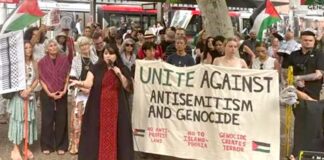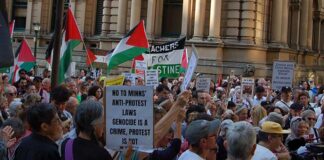A humanitarian crisis, more than 4000 people dead, and thousands more to come if there is not sufficient medical aid…and the rich Western nations do next to nothing.
The unfolding health crisis in the West African countries of Liberia, Guinea, Nigeria and Sierra Leone is the classic case for Western medical intervention. The resources and expertise of the West could make a dramatic difference.
Yet the West fiddles, while lives are lost to a medically controllable disease. The World Health Organisation (WHO) estimates $1 billion in aid is necessary to control the outbreak. So far just a quarter of this figure has been pledged.
Medecins Sans Frontieres (MSF), Doctors without Borders, has grave fears that the outbreak won’t be brought under control for months yet.
The WHO has called the current outbreak “an international public health emergency.”
An un-named WHO official in Geneva warned that West Africa was on the brink of a “humanitarian catastrophe” of unparalleled proportions.
The US Centre for Disease Control and Prevention estimates 1.4 million people in West Africa could be infected by January 2015.
Recently, US President Barack Obama sent 3000 troops to assist construction of treatment centres and training of health workers. But having US troops on the ground also fits with the US trying to build its military presence in the region.
Poverty
Ebola is a disease of dire rural poverty. It is not easily spread, requiring direct contact with bodily fluids. Washing your hands with clean water and soap is enough to prevent most people from contracting the disease and spreading it.
But in a place like Sierra Leone, clean water and soap are luxury items.
So far the mortality rate of the current outbreak is about 50 per cent, but treatment can significantly improve the odds of survival. Three out of five US citizens infected with the virus so far have fully recovered, following evacuation to the US for treatment.
A simple mixture of glucose and water injected in the bloodstream, anti-blood clotting drugs and pain medication can be enough for fit people to survive.
This basic treatment is out of reach for West Africa’s overwhelmingly poor majority of people. The world-wide average for doctors per 10,000 people is 13. In West Africa countries, such as Sierra Leone, it can be as low as 1 doctor for every 10,000 people.
Liberia had 50 doctors for its population of 4.3 million. Basic health protections, like disposable gloves, are not even available for doctors.
Liberia’s capital, Monrovia, doesn’t have one public hospital for its population of one million. Those that exist are all private.
The current outbreak is different to past ones. As a traditionally rural disease, the Ebola virus has usually remained contained to remote villages. This outbreak has spread to the sprawling urban shanty towns and slums, where living conditions are foul.
Liberia’s response to the Ebola outbreak is to rely on international aid, which has been non-existent or slow in coming.
Brett Adamson, an Australian aid worker with MSF, told the Sydney Morning Herald the Ebola crisis was “preventable” and its consequences are on the hands of “complacent” institutions that failed to heed early warnings. He said the Ebola crisis demands aid on “a truly, truly massive scale.”
MSF has called for support from Western governments since June, when the deadly virus broke out in Guinea.
Australia has only donated a pitiful $18 million. Foreign Minister, Julie Bishop, put forward the most ludicrous argument as to why Australian health workers would not be sent to west Africa—that Australia was too far away for evacuation.
She said, “We will not put Australian health workers in a risky situation in the absence of evacuation plans and appropriate medical care.” Why evacuation to Europe or elsewhere could not be arranged was left unexplained.
Africa is losing $192 billion every year to the rest of the world—almost six and a half times the amount of aid given to the continent, according to the NGO Health Poverty Action.
Health Poverty Action has calculated that Africa’s losses include: illicit financial flows; profits taken out of the continent by multinational companies; debt repayments; brain drain of skilled workers; illegal logging and fishing and the costs incurred as a result of climate change.
Africa’s grinding poverty, where in Monrovia up to 70,000 people have access to only four public toilets connected to a sewage system, breeds such mass epidemics. Until there is a world where everyone is properly housed, and there is affordable health care for all, there will be more preventable “humanitarian catastrophes”.
By Tom Orsag





